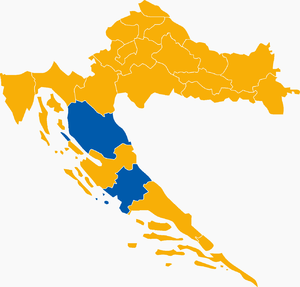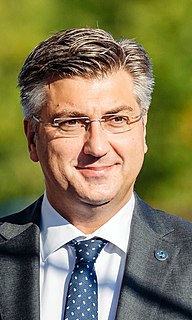| |||||||||||||||||
| Turnout | 50.57% (first round) 51.04% (second round) | ||||||||||||||||
|---|---|---|---|---|---|---|---|---|---|---|---|---|---|---|---|---|---|
| |||||||||||||||||
 Results of the second round in all of Croatia's counties: the candidate with the majority of votes in each administrative division. Stjepan Mesić Jadranka Kosor | |||||||||||||||||
| |||||||||||||||||
Presidential elections were held in Croatia in January 2005, the fourth such elections since independence in 1991. They were the first presidential elections held after the constitutional changes of November 2000, which replaced a semi-presidential system with an incomplete parliamentary system, greatly reducing the powers of the President in favor of the Prime Minister and their cabinet. Incumbent president Stjepan Mesić, who had been elected in 2000 as the candidate of the Croatian People's Party, was eligible to seek reelection to a second term and ran as an independent as the constitution prohibits the President from holding party membership while in office.

Croatia, officially the Republic of Croatia, is a country at the crossroads of Central and Southeast Europe, on the Adriatic Sea. It borders Slovenia to the northwest, Hungary to the northeast, Serbia to the east, Bosnia and Herzegovina, and Montenegro to the southeast, sharing a maritime border with Italy. Its capital, Zagreb, forms one of the country's primary subdivisions, along with twenty counties. Croatia has an area of 56,594 square kilometres and a population of 4.28 million, most of whom are Roman Catholics.

A semi-presidential system or dual executive system is a system of government in which a president exists alongside a prime minister and a cabinet, with the latter being responsible to the legislature of a state. It differs from a parliamentary republic in that it has a popularly elected head of state, who is more than a mostly ceremonial/non-executive, figurehead, and from the presidential system in that the cabinet, although named by the president, is responsible to the legislature, which may force the cabinet to resign through a motion of no confidence.

A parliamentary system is a system of democratic governance of a state where the executive derives its democratic legitimacy from its ability to command the confidence of the legislature, typically a parliament, and is also held accountable to that parliament. In a parliamentary system, the head of state is usually a person distinct from the head of government. This is in contrast to a presidential system, where the head of state often is also the head of government and, most importantly, the executive does not derive its democratic legitimacy from the legislature.
Contents
The elections resulted in the landslide re-election of Mesić for a second five-year term. They were also the first in which a woman, HDZ candidate Jadranka Kosor, took part in the runoff. The percentage of the vote received by Mesić in the second round – 65.93% – is the highest of any president to date. Mesić had received an absolute majority of the votes cast within Croatia itself in the first round, but the votes of Croatian citizens living abroad forced a run-off by reducing Mesić's overall percentage to just under the necessary 50% + 1 vote threshold needed to win in the first round. Voter turnout was 50.57% in the first round and 51.04% in the second round.

The Croatian Democratic Union is a conservative political party and the main centre-right political party in Croatia. It is one of the two major contemporary political parties in Croatia, along with the centre-left Social Democratic Party (SDP). It is currently the largest party in the Sabor with 55 seats. The HDZ ruled Croatia from 1990 after the country gained independence from Yugoslavia until 2000 and, in coalition with junior partners, from 2003 to 2011, and since 2016. The party is a member of the European People's Party (EPP). HDZ's leader, Andrej Plenković, is the current Prime Minister of Croatia, having taken office following the 2016 Parliamentary Election.

Jadranka Kosor is a Croatian politician and former journalist who served as the Prime Minister of Croatia from 2009 to 2011, having taken office following the sudden resignation of her predecessor Ivo Sanader. Kosor was the first and so far only woman to become Prime Minister of Croatia since independence.
Mesić was sworn in for a second term on 18 February 2005 by the Chief justice of the Constitutional Court.













